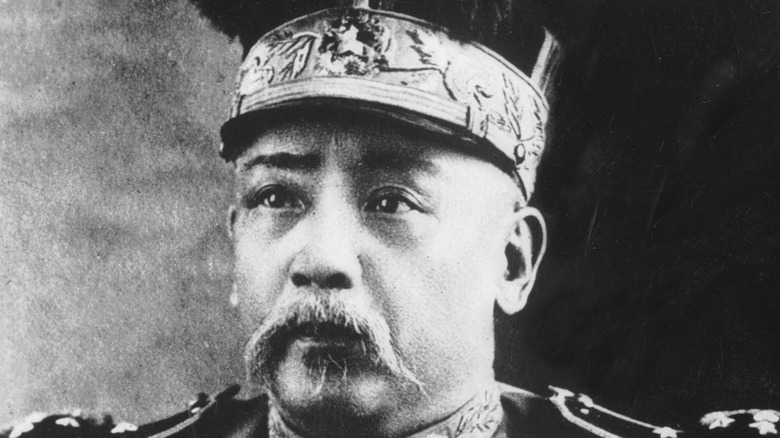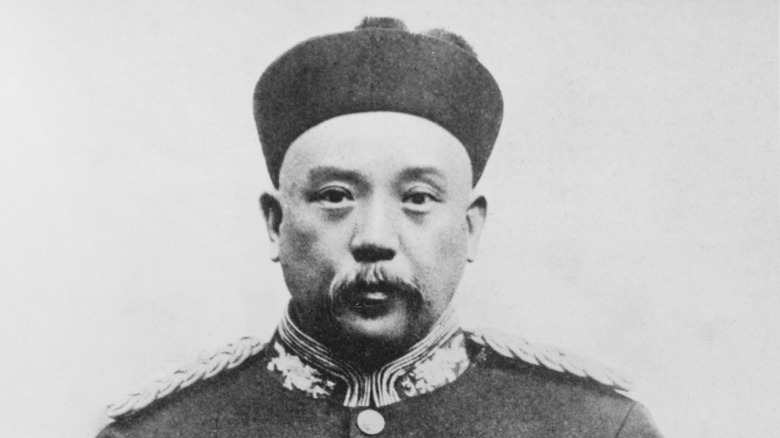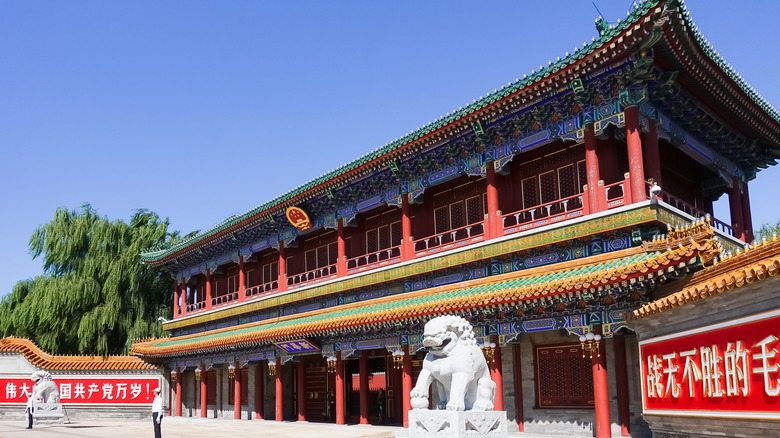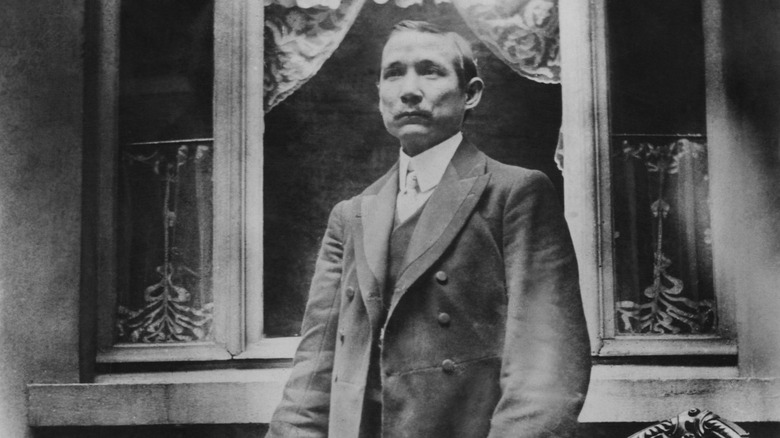The Tragic Story Of Chinese General Yuan Shikai
Few Chinese political figures are as simultaneously influential and infamous as general-turned-president-turned-emperor Yuan Shikai. Yuan was born to a wealthy aristocratic family in 1859 and learned Confucian classics as well as boxing and military strategy in his early years (via China Highlights). He married when he was 17 and attempted to start a career in civil service, but after twice failing the examination necessary to enter, he decided the military would give him his path into politics.
It was at this stage that Yuan first became associated with the Westernization Movement, an ideology within 19th century China that looked to Europe and the Americas for inspiration and influence that would eventually play a key role in his tenure as president. Yuan Shikai became an assistant to general Wu Changqing, commander of the Huai Army, in the spring of 1881, and would later travel to Korea where the young officer would distinguish himself.
Yuan's interest in modernization helped him in Korea
Korea was a bit of a political mess in the 1870s, with an internal power struggle between isolationists and progressives weakening an already-inferior force against the rising power of Japan (via New World Encyclopedia). When this tension boiled over into a coup, exiling the Queen, the Viceroy of Zhili, Li Hongzhang, sent in the Qing Brigade to Korea to help protect the country and quell the tensions. The Huai Army was part of the Qing Brigade, and Yuan was able to successfully quash the rebellion. He was appointed the role of supreme advisor on Korean government policies and led the training of hundreds of troops in modern warfare tactics.
In the 1880s, Yuan, now commander of the Huai Army, helped the Koreans defeat the Japanese when the latter attempted to stage a coup and kidnap the Emperor. After achieving the acclaim of Korean nobles and the Viceroy Li, Yuan was brought back to China after a war with Japan was inevitable and his position in Korea obsolete. On the eve of the First Sino-Japanese War, Yuan was recommended to train the new army that would fight in the battles to come. After a commendable showing in Korea, the officer's career was truly on the rise.
Yuan developed close ties to the military and gained power
In the mid-1890s, Yuan began his new role as an army trainer, and through his education and expansion, the troops grew into the Beiyang Army, the largest land force of the late Qing period that would train many future generals and warlords of the First Chinese Republic. 1897 saw him promoted to chief prosecutor, along with a promotion to President of the Board of Industry the following year. A political schism had formed in China between supporters of Guangxu Emperor and Dowager Empress Cixi; Yuan took the side of the Empress and helped her onto the throne, arresting the Emperor in the process (via Alpha History). 1899 saw his third promotion in three years as he became Governor of Shandong.
As Governor, Yuan promptly betrayed the Empress' trust when she ordered him to support the Boxer Rebellion which was fighting against foreign invasion. Instead, the new governor stifled the rebellion, using his loyal troops to suppress any would-be rebels and prevent the movement from gaining any traction within Shandong. The turn of the century saw Yuan support policies to establish universities, railways, and archaic imperial examinations. The death of the Empress saw a new regent Zai Feng control China. Zai was an enemy of Yuan and had the general dismissed in 1907. That would not be the last he saw of Yuan.
Yuan forced himself into the presidency
In 1911, the Wuchang Uprising broke out and brought an upheaval in the Chinese government. It was clear that the Qing Dynasty was ending, and Yuan Shikai was appointed Chancellor. According to SupChina, revolutionary Sun Yat-sen was earmarked to be the President of the First Chinese Republic, but Yuan used his army to overthrow him and take the title of founder of the Republic. Forcing the Empress to abdicate, the Qing Dynasty was officially dead.
While developing education and economic reforms, sticking to his life-long interests in modernization and Westernization, and remaining popular among his citizens, Yuan ruled harshly and sometimes haphazardly. He sought to solidify his power rather than focus on democracy, which earned comparisons to the Qing Dynasty. He had political rivals assassinated and within three years of his term, had crushed a rebellion, outlawed a rival party, and dissolved parliament. People began calling for a restoration of the monarchy, and Yuan obliged: after a rigged election, a unanimous vote declared Yuan the new Emperor. The move was disastrous. Political enemies were outraged and allies turned their backs on the newly crowned Emperor, who reversed the decision after fewer than three months before he could even conduct an official ceremony. As large swaths of Chinese land declared independence from the president-turned-emperor-turned-president, Yuan died in 1916, leaving behind a torn country that would usher in the "Warlord Era." Yuan spent his whole life gaining the power necessary to lead his country into the next era; what he achieved was political turbulence that would succeed him for over a decade.



